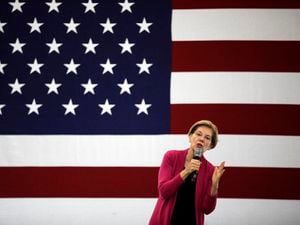White House hopeful Elizabeth Warren outlines 20 trillion-dollar healthcare plan
She said the Medicare for All plan would not raise taxes for middle-class Americans.

US presidential hopeful Elizabeth Warren has proposed 20 trillion dollars (£15.8tn) in federal spending over the next decade to provide healthcare to every American without raising taxes on the middle class.
The details of Ms Warren’s “Medicare for All” plan aim to quell criticism that the Massachusetts Democrat and presidential candidate has been vague about how she would pay for her sweeping proposal.
Her refusal to say until now whether she would impose new taxes on the middle class, as fellow progressive White House hopeful Bernie Sanders has said he would, had become untenable and made her a target in recent presidential debates.
However, her detailed proposal was quickly attacked by her moderate rivals, including former vice president Joe Biden.

In a 20-page online post, Ms Warren said her plan would call on employers to transfer to the government almost all the 8.8 trillion dollars (£6.8tr) she estimates they would otherwise spend on private insurance for employees.
“We can generate almost half of what we need to cover Medicare for All just by asking employers to pay slightly less than what they are projected to pay today, and through existing taxes,” she wrote.
Companies with fewer than 50 employees that do not already sponsor coverage would be exempted from the proposal.
In a nod to unions whose support will be key in the Democratic primary, Ms Warren said that employers already offering health benefits under collective bargaining agreements will be allowed to reduce how much they send to federal coffers — provided they pass those savings on to employees.
Democrats have spent the better part of three decades debating the proper role of government in healthcare, and the complicated politics surrounding the issue quickly resurfaced after Ms Warren released her proposal.
Mr Biden, who favours building on the Affordable Care Act, criticised Ms Warren’s plan for eliminating private insurance coverage and said it still amounts to a tax increase on workers.
For all the attention being paid to Ms Warren’s proposal, Mr Sanders is the chief architect of Medicare for All.
He has previously released several options to pay for his measure, including a 4% income tax “premium” that kicks in after the first 29,000 dollars for a family of four — very much affecting the middle class.
Politics aside, some independent experts raised doubts about the Warren campaign’s estimates.
“They are making more aggressive assumptions about the same things we already made aggressive assumptions about,” said John Holahan, an economist at the Urban Institute who co-authored a recent cost analysis that the Warren campaign is using as a starting point for its estimates.
Then there is the task of passing such legislation through US Congress.

A critical question for Ms Warren is whether her 20 trillion dollar cost estimate is accurate. The Urban Institute recently pegged the cost closer to 34 trillion dollars over 10 years.
“They are underestimating the new federal taxes needed to pay for this by about 15 trillion dollars over 10 years,” said Emory University economist Ken Thorpe, who has done his own estimates of Medicare for All.
If the transfers from private businesses to the government do not raise enough money, Ms Warren says she would make up the difference by imposing a supplemental contribution requirement for big companies “with extremely high executive compensation and stock buyback rates”.
All told, she estimates she could generate 20.5 trillion dollars in revenue through a combination of, among other things, higher levies on capital gains and other investments and new taxes on the wealthiest 1% of Americans.
Some of her other revenue estimates also could hit political obstacles.
Many politicians may be reluctant to side with Ms Warren’s call to raise 800 billion dollars (£618bn) over 10 years by eliminating a Pentagon contingency fund used for anti-terrorism operations.
Another 400 billion dollars (£309bn) represents dividends from an immigration overhaul, a legislative feat that has eluded the past three presidents.
And a whopping 2.3 trillion dollars (£1.7tr) would come from stronger enforcement of existing tax laws — money that would have to be identified and collected before it could be used for a new healthcare system.





